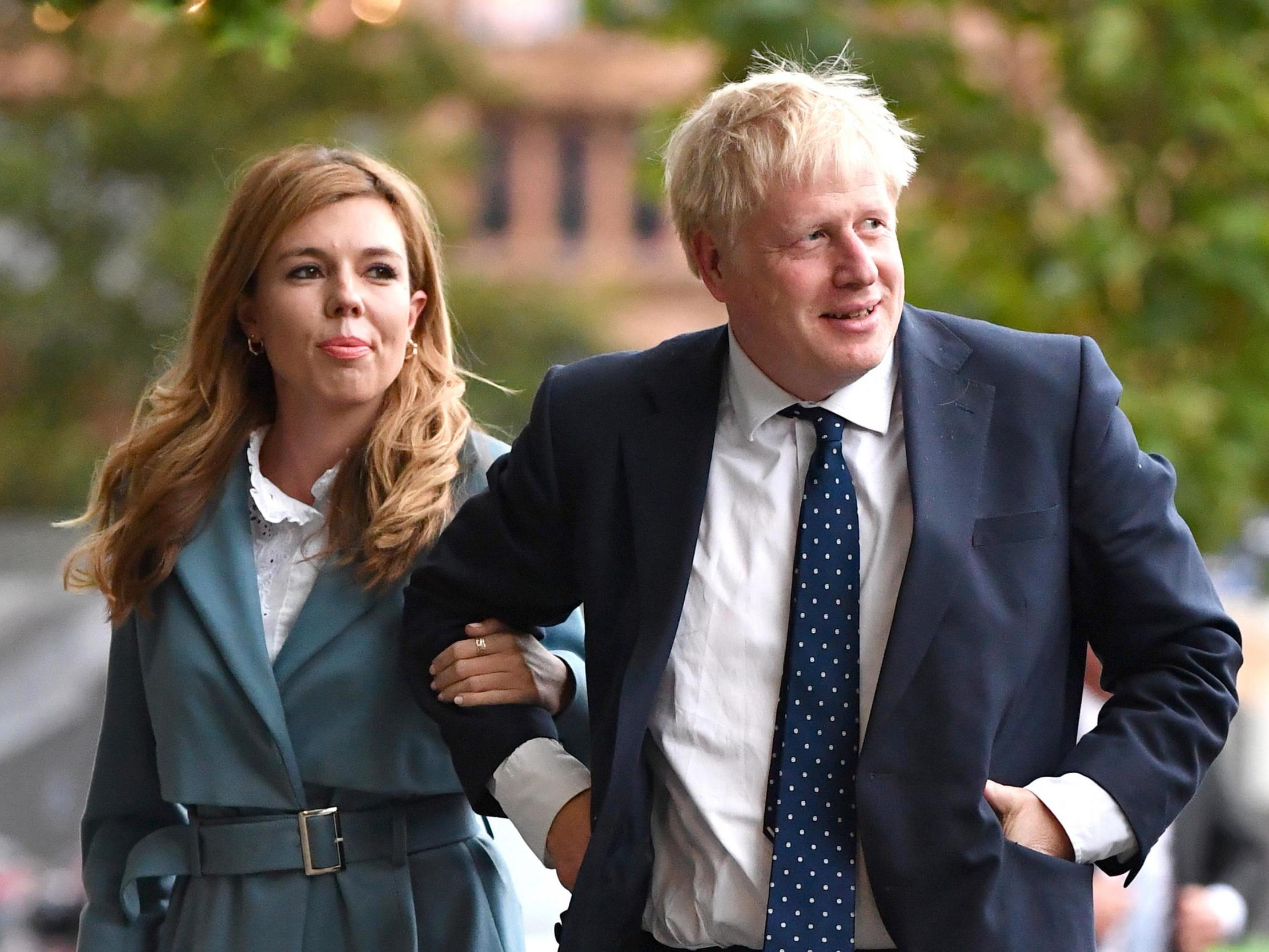Cynicism has no place in pregnancy announcements – but Downing Street has opened the door to it
The timing is interesting, given the other major events the prime minister is having to deal with, writes Matthew Norman


Which of the two possible future vacancies unofficially announced on Saturday – one for a home secretary; the other for a prime ministerial mistress – qualified as more significant? That is the ultimately cynical way to look at things, and it turns out it involves subjective news judgement.
The link between the timing of these revelations was starkly obvious. The politico-journalistic community had an inkling of Carrie Symonds’ pregnancy and the possibility of an engagement weeks or months ago.
Whether the omerta would have extended to Jeremy Corbyn, Keir Starmer or anyone else outside the Boris Johnson Brexit bubble seems unlikely.
Tempted by such a juicy morsel, certain papers would struggle for the self-restraint they extended to the Downing Street pair and their announcement. Some parts of the media showed no such respect for the privacy of the very young when Gordon Brown’s son was diagnosed with cystic fibrosis.
With Johnson, however, the sensitivity of the right wing media is almost saintly. So it fell to the expectant father of child number ? – no breath-holding, please, if you’re waiting on the official figure; this count is the Iowa caucuses on steroids – to break the code of silence himself.
He did so within hours of a senior civil servant breaking a much older and more legitimate omerta. The titans of Whitehall never speak publicly about their political bosses.
Generally, they don’t speak at all unless under subpoena. It is anathema to them to become the story. These are creatures of the shadows, and half as keen on sunlight as Dracula.
Yet here was Sir Philip Rutnam, the newly ex-permanent secretary at the Home Office, telling the media in daylight about actions of Priti Patel, with no hint of the elegant euphemisms that underpin the lingua franca of his tribe.
For him basically to call for a civil service insurrection against this attack on its independence was shocking. No one has confused a Whitehall brahmin for Spartacus before.
Downing Street’s response was less shocking. Only the terminally faux-naif would call for the smelling salts when a regime such as this one potentially politicises a foetus in the cause of news management.
Any lingering question about the timing was clinically removed by a social media post from the bride to be. “I wouldn’t normally post this kind of thing on here,” wrote Symonds, evidently racing the clock to preempt the official bulletin, “but I wanted my friends to find out from me”.
What is shocking, though unsurprising, is how well the doltish tactic worked. The front page of the Sunday Telegraph and the paper’s coverage deserves a module of its own in all decent media studies courses.
On a day not notably devoid of sensational news, what with the virus on the edge of going pandemic, its splash was headlined “No 10 wedding – and a baby too”. Personally I’d have appended an exclamation mark and the smiley face emoji. But you can’t have everything.
Only at the bottom left of the page is a reference to the top civil servant at the Home Office launching an action for constructive unfair dismissal against the home secretary. Time will relate whether Patel follows him out the door.
But if other reactionary organs were less sycophantic, it wasn’t by much. This is not as mean spirited (who doesn’t love babies?) as it may appear. Our mainstream written media is, with a few noble exceptions, a traitor to the standards to which it paid heart melting homage before Lord Leveson.

What we celebrate as a free press is limited to a few outlets with a genuine commitment to reporting the news, and none to distorting it by commission or omission.
While this has always been so, particularly during the Thatcher imperium, it has never been as dangerous as now. The precipitous decline in newsstand sales has barely weakened the power of front pages to shape public debate and opinion.
Donald Trump’s “We love the poorly educated” was one of the few palpable truths he ever spoke. But he should have added is: “and we love the poorly informed even more”.
The suppression of information, by ignoring or downplaying or deceitfully slanting it, has become a mortal menace to this country’s survival as a functioning democracy.
It delivered Brexit and it gave us Johnson. Now it threatens to enable him to incinerate his own Brexit deal, to damage the civil service beyond repair, to cement the Tory hold on government by importing voter suppression techniques from the US, to politicise the judiciary, and more besides.
We are incomparably more vulnerable than America to a slide into a meek form of fascism thanks not only to the absence of the constitutional protections that remain, however strained, pretty robust over there.
We are more vulnerable because mainstream US newspapers and online resources, even if owned by plutocrats, unflinchingly hold themselves to high moral, ethical and professional standards.
Here, readers of mass circulation titles are often presented with an alternate universe that cynically denies them the knowledge to make informed judgments.
The Independent was launched by three journalists in the mid-1980s largely as a reaction against the partisanship, driven by commercial motives, they felt existed in the papers for which they previously worked.
That one of the trio was a certain Matthew Symonds, imminent prime ministerial father in law, is merely the latest in an unending sequence of Johnson-related ironies on which it is too painful to dwell.
Join our commenting forum
Join thought-provoking conversations, follow other Independent readers and see their replies
Comments
Bookmark popover
Removed from bookmarks